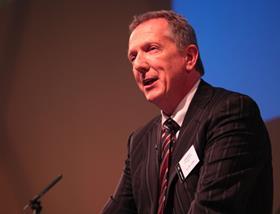
The UK has the ability to produce greater volumes of domestically-grown tomatoes, peppers and cucumbers at consistent quality levels, but the current financial climate is deterring companies and banks from further investment in the sector.
This was the assessment of Chris Mack, executive chairman of Fresca Group, the country’s largest privately-owned fresh produce business, who said that limited UK production was failing to meet high consumer demand for British products.
Speaking at the Oxford Farming Conference yesterday (6 January), Mr Mack said that the availability of modern greenhouses and the latest technology meant that the UK had the ability to produce “consistently superb quality” products, all year round if required.
But, he said that British growers still had to compete on product affordability, and the fact that more than 80 per cent of tomatoes consumed in the UK are still imported.
“The latest technology in protected horticulture is there in part to make the growing process more efficient, but it’s a significant investment and requires quite some commitment,” said Mr Mack.
Over the past two years, Fresca has invested €118m (£100m) in the development of its Thanet Earth hydroponic greenhouse project in southern England, which it estimates will ultimately add 15 per cent to the UK’s production of tomatoes, cucumbers and peppers.
So far, construction has been completed on three greenhouses which began
production in February 2009, with a further four greenhouses expected to be added to the site over coming years.
However, the project has not been without its challenges for Fresca and its three Dutch grower partners – Rainbow Growers, Kaaij Redstar and A&A. The group last year attributed a 45 per cent year-on-year drop in pre-tax profits for 2009 to the high start-up costs incurred during Thanet’s Earth’s construction.
Despite this, Mr Mack told the conference that Fresca was already working with its partners on research into varietal development and into ways to increase yield without compromising on flavour.
He also believes the UK can sustain much more production of salad crops than is currently grown, even with a big new entrant to the market like Thanet Earth.
“The biggest barriers to industry growth in my mind are probably finding suitable sites, ambition and investment,” Mr Mack said.
“Growers have a big job to do to trigger further investment in the field, particularly given the current financial climate.”



